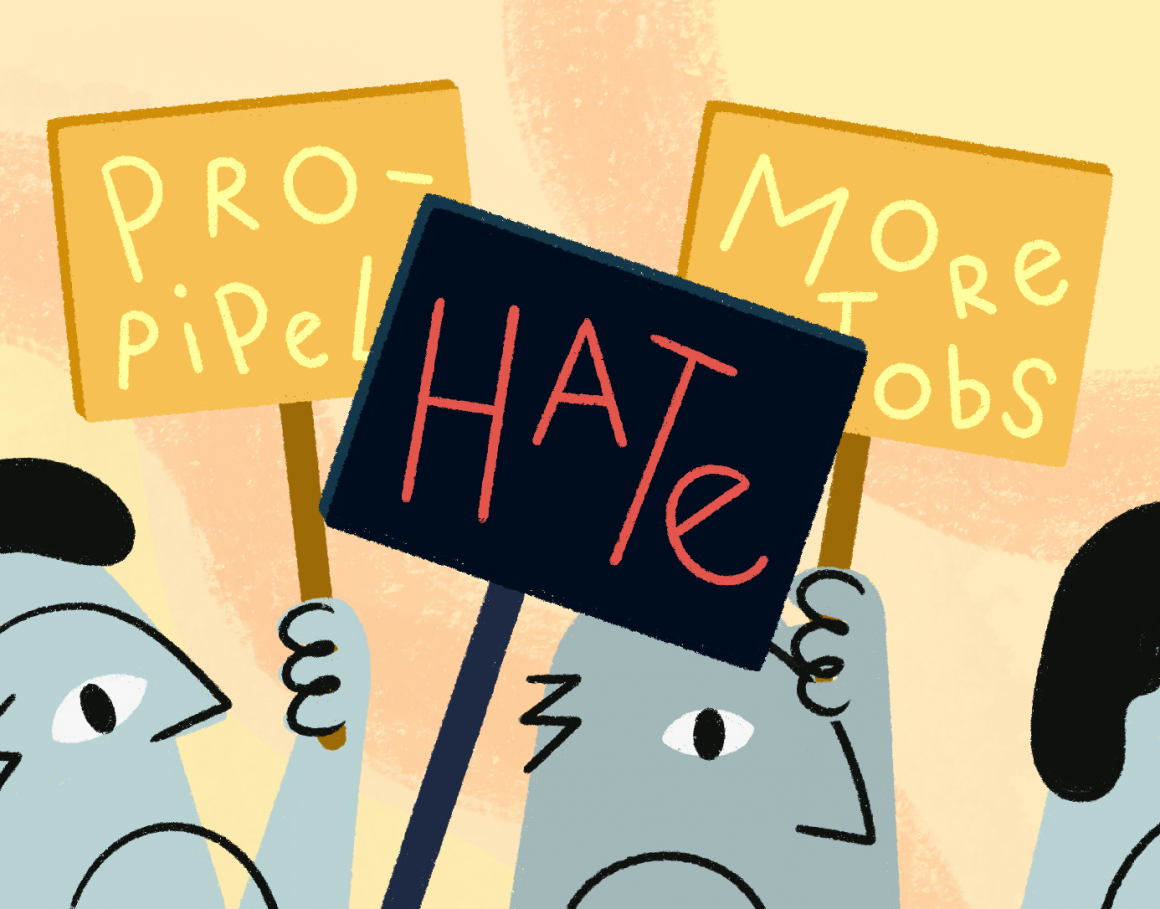
Look out for hateful groups latching onto popular political movements
March 1 2019 —
Unless you lived under a rock this February, you’ll know that a pro-Trans Mountain pipeline convoy called ‘United We Roll’ made its way from Red Deer all the way to Parliament Hill. The convoy enjoyed over a week of doting media attention as a steady part of the media cycle.
What you might not know from media coverage is that racist and anti-immigrant sentiments were propagated by the convoy’s organizers and participants alongside their pro-energy message. The convoy was originally called the Yellow Vest Convoy, in reference to the Canadian yellow-vest movement, whose members frequently spread hateful rhetoric against immigrants, particularly Muslims. It’s clear from photos of signs carried by vehicles as part of the convoy — “NO UN/GLOBALISM,” “Open borders breed chaos,” “Trudeau for treason” — that these views are, at the very least, auxiliary to its pro-pipeline message.
There’s mountains of evidence showing that the United We Roll convoy was a part of a larger, radical movement spreading xenophobic rhetoric, much of it compiled by the Canadian Anti-Hate Network. It’s clear that though these groups’ agendas may include building a pipeline and supporting Canada’s energy industry, those are far from the only beliefs they wish to spread.
A number of prominent politicians lent their support to the convoy. Most notable of these was federal Conservative leader Andrew Scheer, who spoke to members of the convoy during a rally on Parliament Hill. White nationalist Faith Goldy was among other speakers at the same rally.
Another Parliament Hill speaker was Saskatchewan Senator David Tkachuk, who encouraged the crowd to “roll over every liberal left in the country.” And while they weren’t present at the rallies, Ontario Premier Doug Ford and Alberta Opposition leader Jason Kenney each tweeted their support for the convoy. Many high-profile voices gave the convoy credence while doing nothing to denounce the racist views inextricably tied to the movement.
The views propagated by members of the yellow-vest movement are the same kind of rhetoric that radicalized Alexandre Bissonnette, the man who killed six Muslim men in a Quebec City mosque in 2017. There are countless other examples of these hateful views spilling over into real-life violence against marginalized communities.
But it’s important to emphasize that those who participated in the convoy do not represent Albertans at large. While the yellow-vest movement brings with it some effective imagery, with the vests themselves serving as a cheap and readily obtainable symbol of the working class, it’s hard to believe that the few hundred convoy members who were able to take off from their jobs for a week while spending hundreds in fuel and accommodations are actually indicative of the average Albertan oil and gas worker. Yes, people who believe in a cause can make arrangements to allow themselves to participate in demonstrations like this. But it’s absolutely not something that the vast majority of Albertans are able to do.
Talking about pipelines when talking about the United We Roll convoy buys into exactly what the convoy’s members and organizers want you to do — normalize their radical views under the guise of support for the oil and gas sector.
Divisive rhetoric will inevitably ramp up as the upcoming provincial election nears. Conversations about the pipeline and Alberta’s economy will be front-and-centre during that time. These are reasonable and necessary conversations — but there will likely be exclusionary and dangerous rhetoric alongside it. Make an effort to digest the political messages you see through a critical lens throughout this election cycle and beyond.
— Jason Herring, Gauntlet editorial board
